Listen to this article (with local TTS)
-
'We want to know exactly what happened': Man who lost four family members in crash demands answerspublished at 14:26 British Summer Time
-
Families should be able to hear cockpit audio recordings, says cousin of victimpublished at 14:04 British Summer Time
-
US investigators thank Indian partners for co-operationpublished at 13:49 British Summer Time
-
Watch: How fuel switches could have been cut offpublished at 13:33 British Summer Time
-
US aviation watchdog says priority is to follow facts - reportpublished at 13:01 British Summer Time
-
UK government says it will review report in detailpublished at 12:37 British Summer Time
-
Watch: Firefighters work at crash scenepublished at 12:17 British Summer Time
-
'My nephew was the pillar of our house'published at 11:52 British Summer Time
-
No significant drop in air traffic following June crash, air safety regulator sayspublished at 11:32 British Summer Time
-
'We lost family members even though they weren’t on the plane'published at 11:11 British Summer Time
**Tejas Vaidya**
BBC Gujarati
Nareshsinh Thakore's two-year-old daughter and his mother-in-law, Sarlaben Thakore, were among the 19 people who were killed on the ground after the plane crashed into a busy neighbourhood.
On 12 June, like every other day, Sarlaben had gone to the BJ Medical College to deliver food when the plane crashed into the hostel complex. The child was with her at the time.
"We lost family members even though they weren’t on the plane," Nareshsinh Thakore says.
"How can I comment on the findings of the report? We don't have any technical knowledge to understand it," he adds.
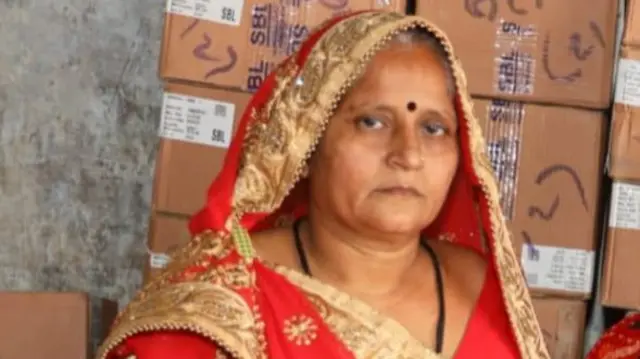Image source, Nareshsinh Thakore
Image caption,
Sarlaben Thakore was at the doctors' hostel when the plane crashed into the building
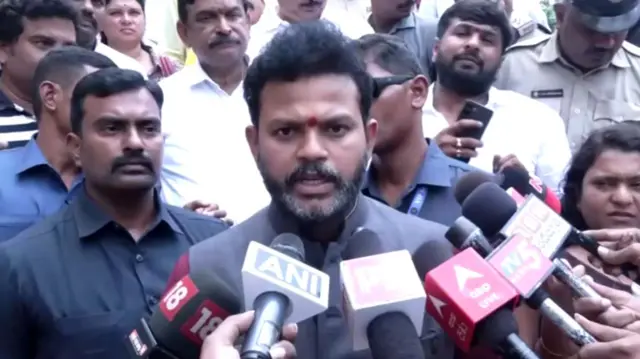Image source, Reuters
Indian Civil Aviation Minister Ram Mohan Naidu is urging people to not "jump to any conclusions" following the release of the preliminary report.
Speaking to reporters on Saturday, he says: "Let's not jump to any conclusions at this stage. Let us wait for the final report."
Naidu goes on to thank the efforts of the pilots and crew in India, describing them as the "backbone of this civil aviation".
Naidu adds that believes India has "the most wonderful workforce in terms of pilots and the crew in the whole world."
**Samira Hussain**
Reporting from Delhi
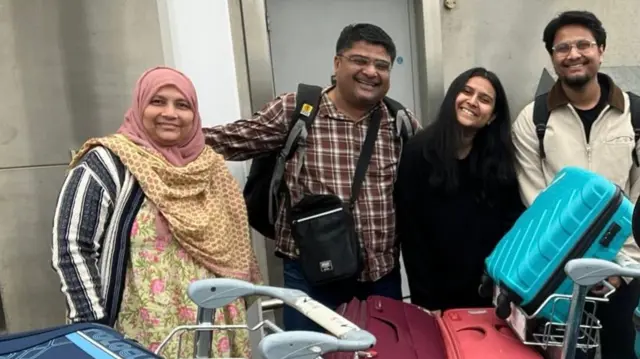Image source, Family handout
When Badasab Syed, 59, went to offer prayers at his local mosque in Ahmedabad this morning, fellow worshippers told him about the newly released report on the crash.
Syed, who lost his brother, sister-in-law and their two children in the crash, returned home to see if the report offered any clues about what really happened to the ill-fated flight. But after watching the news, he was left with more questions than answers.
“The report mentions the pilots discussing who turned off fuel and a possible issue with the fuel control switch. We don’t know what that means? Was it avoidable,” he asks.
His brother, IT professional Inayat Syed, 49, had come to India to attend a family wedding. He was traveling back with his wife and their two adult children.
Badasab says the information in the report is for the experts to determine if it was a technical or human error.
But he is disappointed that there are no recommendations yet for Air India or Boeing to prevent such incidents.
"We may have to wait for the final report.”
**Tejas Vaidya**
BBC Gujarati
Faizan Rafiq was among the 260 people killed in last month's crash.
The 25-year-old had moved to the UK five years ago and was visiting India to celebrate Eid with his family and undergo dental treatment.
His father, Rafiq Dawood, says the crash and Faizan's death have been deeply painful for the family, regardless of whether it was caused by a technical fault or something else.
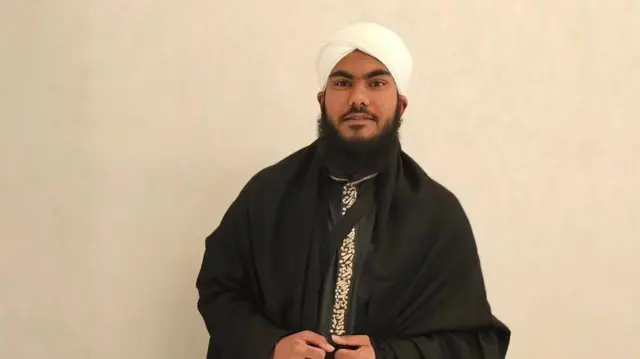Image source, Rafiq Dawood
Image caption,
Faizan Rafiq had come to India to celebrate Eid with his family
"We don't know about the fuel switch or other technical details. The fact is that we have lost our son," he said. "We don’t have words to describe the pain we’ve felt over the past month."
Dawood, who lives in the western Indian town of Diu, says he has completed all the formalities to receive compensation and has been told by the airline that further communication will be sent via email.
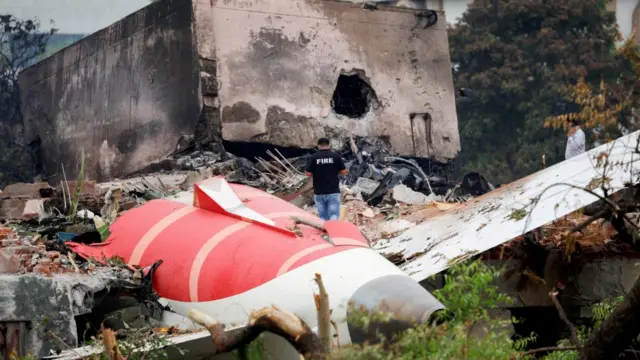Image source, Reuters
It's been just over 12 hours since the preliminary report into the Air India crash on 12 June was published by India's ministry of civil aviation.
Here's what we know:
**The crash**: The Boeing 787-8 Dreamliner was destined for Gatwick, departing from the western Indian city of Ahmedabad. It crashed into a densely populated area seconds after take-off, killing 260 people. The pilots issued a mayday signal.
**The report**: The fuel switches, which turn the engines on and off, [were cut off shortly after take-off.](https://www.bbc.co.uk/news/live/cx20p2x9093t?post=asset%3Aed14b13c-71b1-45a5-9418-0c677793a6a1#post) They were then turned back on, but the engines failed to regain thrust. We learned that a pilot could be heard asking the other in a voice recording: why did you cut off? The other replied he did not do so. No significant faults have been found with the plane or its engines so far.
**The Air India response**: In a statement, the airline said it [stands in solidarity with those affected.](https://www.bbc.co.uk/news/live/cx20p2x9093t?post=asset%3Aede98983-fa04-4d89-b381-26dc81cdb190#post) It acknowledges the report and says it will continue to work with the relevant authorities.
**The reaction**: Some of the relatives of crash victims feel frustrated. Dr Mario Donadi, colleague of victim Dr Prateek Joshi, says the report is ["a huge slap in the face".](https://www.bbc.co.uk/news/live/cx20p2x9093t?post=asset%3A24e2665e-62c9-42fe-99e5-342606bbfb2a#post) Experts tell the BBC that the fuel switches cannot easily be knocked off. They're "protected against somebody just brushing against it," [says professor Graham Braithwaite.](https://www.bbc.co.uk/news/live/cx20p2x9093t?post=asset%3A00dbeb85-df68-44fd-ae15-16c421114fdd#post) The Airline Pilots' Association of India calls for further transparency with the investigation.
**The next steps**: Investigations will continue. There will be testing of fuel samples, analysis data of two inflight recorders and an analysis of post-mortem reports of the crew and passengers. A final report is expected within a year.
**Soutik Biswas**
India Correspondent
The question has been on pretty much everyone’s mind since the crash.
Faiz Ahmed Kidwai, head of India’s aviation safety regulator DGCA, told me last week that “India’s skies have always been safe - past and present”.
He points to global safety data from the International Civil Aviation Organization (ICAO), showing that India often outperformed the world average in accidents per million flights.
Kidwai notes that between 2010 and 2024, only two years saw India’s accident rate rise above the global average - and those were linked to major accidents.
So, while every tragedy is devastating, India’s overall aviation safety record remains strong, he says.
I have also asked him about recent headlines that have raised concerns - from a Delhi-Srinagar flight that hit severe turbulence to growing reports of maintenance oversights and training shortfalls - you can [read more about what he has to say here](https://www.bbc.com/news/articles/cvgnr828z0go).
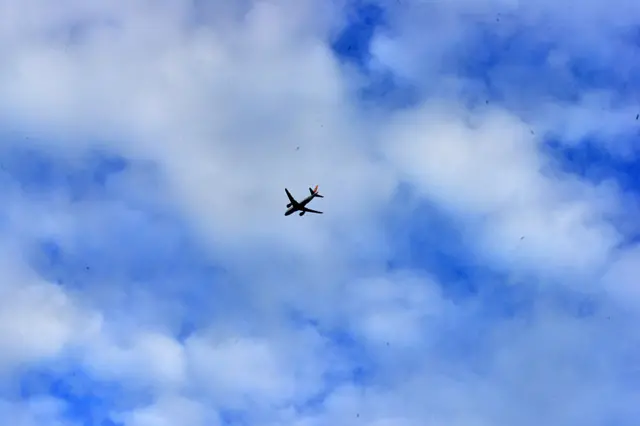Image source, AFP
The Airline Pilots' Association of India (ALPA India) has reacted to the preliminary report on the crash, raising concerns over the way the investigation is being handled.
In a statement reported by [Indian media, external](https://www.cnbctv18.com/business/aviation/air-india-plane-crash-pilots-union-include-in-capacity-of-observers-ongoing-probe-19636096.htm), the pilots' union said it was "surprised at the secrecy surrounding these investigations" and alleged that "suitably qualified personnel were not taken on board for the probe".
“We feel that the investigation is being driven in a direction presuming the guilt of pilots and we strongly object to this line of thought,” ALPA India's president, Captain Sam Thomas, says in the statement.
The preliminary report says just seconds after take-off, the cockpit audio captured one pilot asking the other, “Why did you do the cut off?”, referring to the fuel switch that starved the engines. The other replied, “I didn’t.” It's still unclear who asked the question and who answered.
The union urges the authorities to allow it to join the process to help ensure transparency.
“We once again request the powers that be to include us even in the capacity of observers so as to provide the requisite transparency in the investigations,” the statement adds.
**Soutik Biswas**
India Correspondent
There was much speculation about the Air India Boeing 787's Enhanced Airborne Flight Recorders (EAFRs) - or the "black boxes" - which will help tell the story of the crash.
These devices record flight data and cockpit audio, including pilot mics, radio calls and ambient cockpit sounds.
The preliminary report offers key insights into how they were recovered and what they revealed.
One recorder was found on 13 June, a day after the crash, atop a building, heavily damaged by impact and heat, with exposed wires and burned connectors.
The second was recovered three days later near another building, still attached to its equipment shelf.
Both were sent to the AAIB lab in Delhi on 24 June. As in previous cases, investigators used a “Golden Chassis” - an identical EAFR unit - and special download cables sourced from the NTSB in the US to extract the data.
The AAIB successfully retrieved about 49 hours of flight data covering six flights, including the crash, and two hours of cockpit audio capturing the final moments.
**Nikita Yadav**
BBC News, Delhi
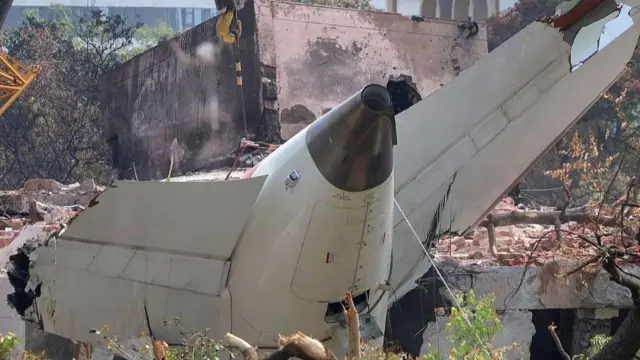Image source, Getty Images
Both Enhanced Airborne Flight Recorders (EAFR) were recovered from the wreckage within four days of the crash.
The EAFR, or "black box", captures audio from the cockpit, including pilot conversations and alarms, and logs crucial flight data like altitude, speed and engine performance.
It is a vital tool in air crash investigations, helping experts reconstruct the flight's final moments.
The black boxes, unlike the name suggests, are actually two bright orange devices designed to survive a crash. They are painted with reflective strips for easier recovery.
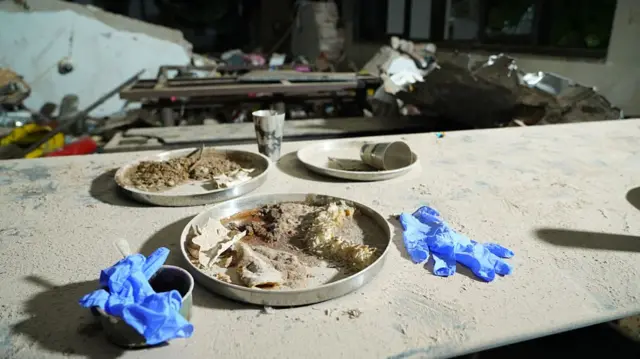Image source, Getty Images
Image caption,
Plates with food seen at the dining hall of the BJ Medical College after the crash
On the afternoon on 12 June, the dining hall at the residential hostel of BJ Medical College in Ahmedabad was teeming with students getting lunch.
The room buzzed with the sound of jokes, banter between friends and the odd bit of academic discussion.
By 13:39 local time, there were at least 35 people in the cafeteria. Some had already collected their food and were lounging around, while others were in the queue waiting for their turn.
In seconds, everything changed.
The general hum of the canteen was pierced by the sound of approaching jet engines - and the room exploded.
We now know that 19 people died on the ground after the Air India flight crashed into a busy neighbourhood in Ahmedabad, seconds after taking off.
In the aftermath of the crash, the BBC spoke to eywitnesses to piece together what happened in those terrifying few seconds - you can [read it here](https://www.bbc.com/news/articles/cz0dkrz1kneo).
Perhaps the most crucial thing to emerge from the preliminary report is that the plane's fuel switches were cut off shortly before the crash.
"It's a really important switch and therefore it's one that's protected against somebody just brushing against it," explains Graham Braithwaite, director of Aerospace and Aviation at Cranfield University.
Speaking to BBC Radio 4's Today programme, he says in order for a pilot to move the switch, "they've got to lift it and move very positively the position".
He points out the report does not say a pilot moved the switch, and at this stage "you would expect the report to keep an open mind".
On wider danger to passengers, he says the area of focus in this investigation is "very specifically on this flight, on this particular aircraft on this day".
"The 787 had flown a billion passengers safely prior to this flight" and it has a good record, Braithwaite adds.
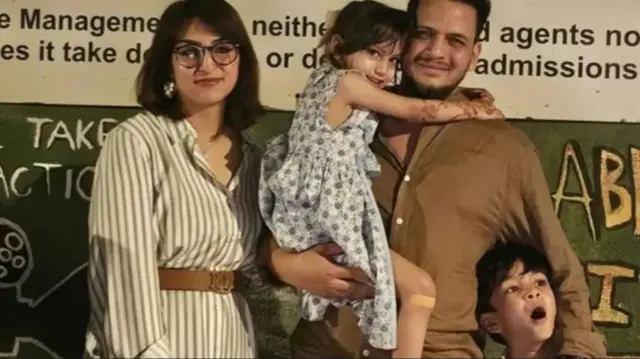 Image source, Handout
Image source, Handout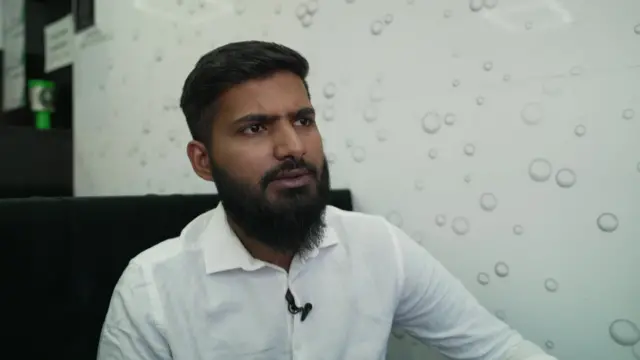
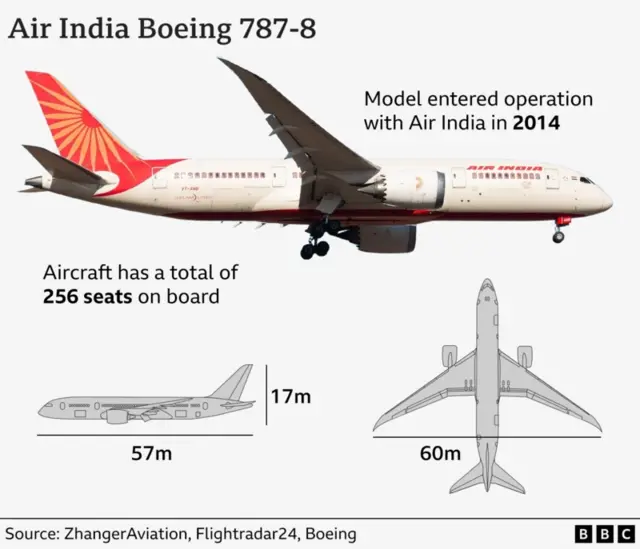
 Imogen James
Imogen James Image source, Rafiq Memon
Image source, Rafiq Memon Soutik Biswas
Soutik Biswas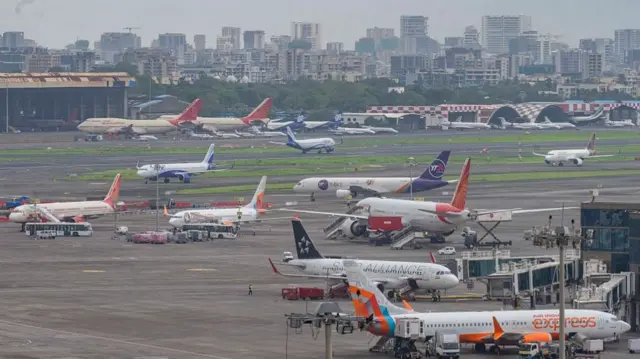 Image source, Getty Images
Image source, Getty Images